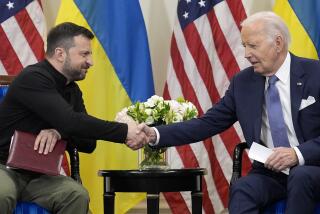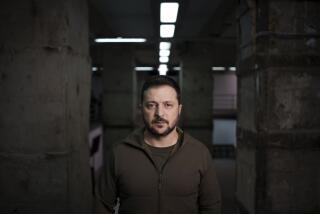Yeltsin’s Warnings Grow Dire : Russia: If reforms fail, ‘a dictator will arise,’ he tells the French.
- Share via
PARIS — His predecessor tried mightily to charm the West, but Russian President Boris N. Yeltsin seems to want to scare it. In dire tones and with ever-increasing urgency, he is telling the world: Help me now, or tyranny will again return to Russia.
In the ornate Salle des Fetes at the Paris City Hall, before a well-heeled crowd of dignitaries and Paris glitterati, the towering, 61-year-old Siberian was blunter than ever on Thursday.
“The delay in the international community’s aid to Russia is becoming dangerous,” Yeltsin warned. “If Russia fails in its reforms, notably the economic ones, a dictator will arise. Neither Russia nor the international community can allow a dictator to appear,” he added.
Earlier, in a meeting with French Prime Minister Edith Cresson, Yeltsin said he does not like to speak in terms of an international bailout for Russia, even if help has become vitally necessary. “This aid should rather be called assistance for our reform process,” he insisted.
The alternative, Yeltsin made clear, could very well be a fascist or Communist military takeover in Russia just weeks after the formal demise of Soviet power and the Soviet Union itself.
“Yes, we have the right to count on support from the international community, or else the reforms that will be implemented could freeze up,” Yeltsin said in a speech at the Hotel de Ville, the sprawling building on the Right Bank of the Seine that houses Paris’ government. “I have faith in these reforms--they are irreversible--but should they fail, I can already feel on the back of our neck the breath of those people who wear red shirts and brown shirts.”
Yeltsin’s visit to Paris, which will wind up today with the signing of a Franco-Russian treaty and a news conference, is the Kremlin leader’s latest venture in a flurry of diplomatic activity that has also taken him to London, New York and Washington.
In particular, Yeltsin is seeking massive assistance for Russia’s shell-shocked consumers and industrialists as the country attempts a rapid transition to a market economy.
But he is also putting his skills as a globe-trotting head of state to their first genuine test. And the contrasts with former Soviet President Mikhail S. Gorbachev, the man Yeltsin succeeded as supreme leader in Moscow, have been intriguing.
“He is much more focused, direct and forceful than Gorbachev,” said Michel Tatu, a noted French Sovietologist and former Moscow correspondent for Le Monde.
Unlike Gorbachev, Yeltsin, while abroad, has not been delivering rambling philosophical discourses on reform processes, cracking jokes or trading repartee with other world leaders. As he does at home, he has been expressing himself in simple, forceful sentences.
“There was one recent comment I liked in particular,” Russian Foreign Ministry spokesman Vitaly I. Churkin recalled. “I think it came in New York. A journalist asked Yeltsin a question and said, ‘Please be specific.’ And Yeltsin said, ‘I am always specific.’ ”
While in Paris, Yeltsin has been saying that the next three months will be crucial for the success of his economic reforms--and consequently for his effort to create a “free and democratic Russia.” If France and other Western nations decide not to invest or offer aid under today’s admittedly bleak economic conditions, they may save a franc now, but it will cost them a thousandfold later, Yeltsin said.
There will be no second opportunity, he cautioned. This is “the last chance for Russia to enter the democratic nations of Europe and the world,” Yeltsin said.
As an indication of how badly living standards have been deteriorating in Russia, threatening support for Yeltsin’s leadership, Moscow’s vice mayor, Yuri Luzhkov, said in a television interview broadcast Thursday that 95% of the more than 9 million people who live in the Russian capital now live below the official poverty line.
After hearing out Yeltsin, Cresson announced that France will lend Russia 1.5 billion francs, about $420 million, to help the Moscow government buy grain, as well as a similar amount to finance the purchase of industrial goods.
But that announcement was somewhat misleading, since, according to Yegor T. Gaidar, the top Russian official for economic affairs, the sum for grain is Russia’s share of a 2-billion-franc loan the French had already awarded the now defunct Soviet Union. One of the goals of Yeltsin’s trip is to claim for Russia most of the credits given to the former Soviet Union.
Cresson said that a number of Franco-Russian agreements to be signed during Yeltsin’s stay will encourage private investment in Russia. She also said France is ready to support Moscow’s membership in major international financial institutions, including the World Bank and the International Monetary Fund.
France, the homeland of cold Cartesian rationality, was largely immune from emotional outpourings of “Gorbymania” during Gorbachev’s reign, and the popular reaction of the Frenchman in the street to Yeltsin seems, if possible, even more muted.
When Russia’s leader paid a visit to the Arc de Triomphe to lay a wreath in memory of France’s war dead, more police officers than spectators turned out. Unlike Gorbachev, Yeltsin has so far made no sudden plunges into crowds, which have been far sparser anyway.
Yeltsin’s lucid, frank speech at the Hotel de Ville was greeted with applause, and his host, Paris Mayor Jacques Chirac, paid him the ultimate compliment by likening Yeltsin’s defiance during last August’s abortive putsch in Moscow to the World War II role of France’s Charles de Gaulle, who led the Free French forces against Nazi Germany.
More to Read
Sign up for Essential California
The most important California stories and recommendations in your inbox every morning.
You may occasionally receive promotional content from the Los Angeles Times.










